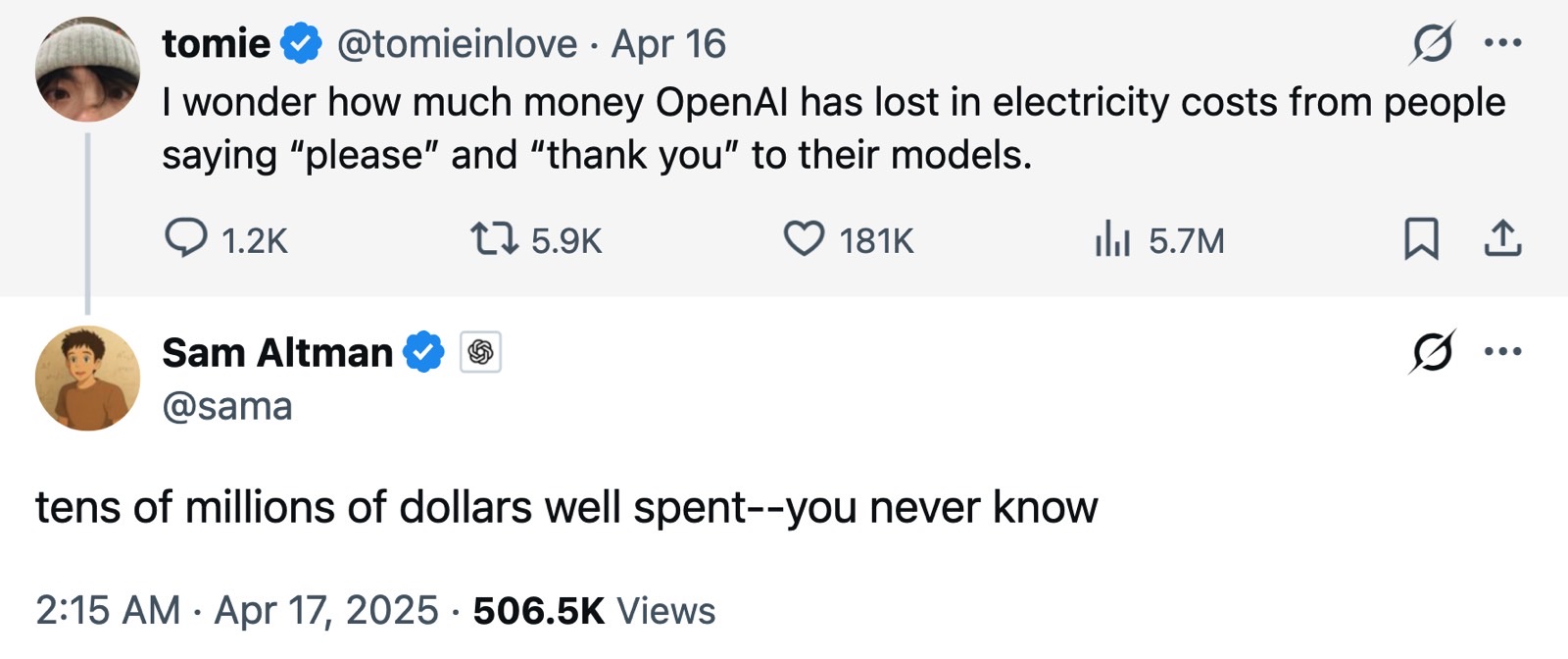I don’t always do it, but I do say “please” and “thank you” when talking to AI chatbots like ChatGPT. I use lots of words in those prompts, including appellatives like “Hey ChatGPT…” After all, that’s the point of sophisticated AI models that understand common speech. You can tell them what you’d like them to do via conversational prompts.
The AI’s ability to understand the way humans talk and answer prompts in kind is the huge advancement that came with ChatGPT-like genAI products. You don’t want to have to learn a new language for interacting with AI. Instead, AI-like ChatGPT has to understand your words as they are spoken (typed) in regular language.
“Please” and “thank you” are already part of human-to-human etiquette, and it’s no wonder they come naturally when talking to ChatGPT.
What you might not realize, and I’ve never really considered it either, is that typing all those “please” and “thank yous” consumes energy because ChatGPT will always process that information. According to Sam Altman, that amounts to millions of dollars in electricity costs, which are “well spent.”
Every time you send a prompt to the AI, it will analyze your query before it answers, and that involves data processing in the cloud, which uses electricity. The longer the prompt, the longer the processing. Adding “please” in prompts will inevitably lengthen the commands.
The same goes for saying “thank you” when you’re happy with the AI’s work. That prompt will generate processing costs, and the AI will always answer back, so it’ll consume additional power to address your answer. Typing the occassional “fuck” when ChatGPT messes up, and you’re annoyed at its failures also produces extra costs, of course.
I don’t always stop to consider how much electricity I’m wasting with some of my prompts, especially the sillier ones. But an X user wondered how much “please” and “thank you” cost.
“I wonder how much money OpenAI has lost in electricity costs from people saying ‘please’ and ‘thank you’ to their models,” tomie said on X.

“Tens of millions of dollars well spent — you never know,” Altman surprisingly answered.
What did the CEO mean by “you never know”? I’m sure you’ve all seen the memes about the upcoming AI apocalypse, in which the AI of the future takes over the world, and its robots spare the humans who were always saying “please” and “thank you” to the early AI models.
It’s not just a meme, as Futurism points out. A late 2024 survey showed that some 67% of Americans said they were nice to the chatbot. Of those, 55% said it was the right thing to do, but 12% said they were appeasing the algorithm in case the AI would take over the world.
We have no way of knowing whether Altman meant that AI apocalypse. I’m less worried about that doom scenario, so I see Altman’s “you never know” response has anything to do with that. But I agree that it’s money well spent from a different point of view. “Please” and “thank you” are key to who we are as a species. There’s no point losing it to make talking to AI more efficient when it comes to operational costs.
We’ve reached this milestone (talking to AI about everything) after hundreds of years of evolution. We’ve learned to be polite, to get along (most of the time), and to collaborate for our collective improvements. We’ve also fought a lot along the way, but etiquette evolved as a result of that, too. Treating models like ChatGPT as we treat humans is only natural.
Generating all those Studio Ghibli images with ChatGPT, creating deepfake celebrities, and turning pets into humans, while fun, are more energy-intensive tasks than “please” and “thank you.”
Also, while the science isn’t necessarily clear on ChatGPT etiquette and the quality of responses, there are those who think “please” and “thank you” will certainly help.
Microsoft’s design manager, Kurtis Beavers, is one of them, having said that using polite language when talking to the AI sets the tone for the AI’s responses.
So yes, it is money well spent. If you want to be more energy-conscious about your (ab)use of AI, you should find ways to offset your carbon footprint related to AI consumption rather than cutting down on “please” and “thank you.”

